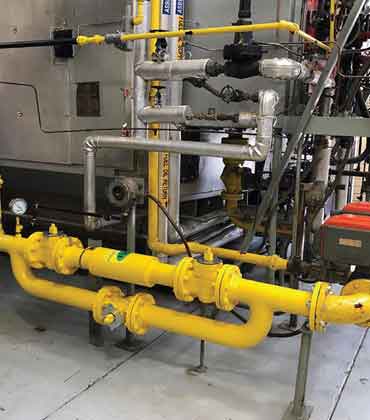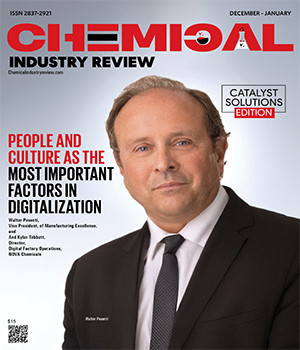Two influential factors significantly impact businesses across all industrial sectors. First, the persistent high cost of fuel substantially challenges financial profitability, necessitating resource optimization and cost reduction. Second, pollution presents a dual threat, encompassing ecological and financial implications that reverberate through industries.
At this juncture of economic burden and environmental consciousness, a transformative force emerges—the Fitch Fuel Catalyst by Advanced Power Systems International, Inc. (APSI). The catalyst is a heterogeneous metallic alloy (HMAC) that, when in use, reformulates the molecular composition of fuel at ambient temperatures and pressures. It is a true catalyst, setting a new standard for enhancing fuel efficiency and reducing emissions.
 “The Fitch Fuel Catalyst possesses a distinct capability to reformulate gasoline, diesel, fuel oil, propane, and natural gas. This innovation unlocks latent energy potential within fuels, delivering reduced fuel consumption or heightened production and performance, increased horsepower, and torque, to customers,” says Win Fitzpatrick, President of APSI.
“The Fitch Fuel Catalyst possesses a distinct capability to reformulate gasoline, diesel, fuel oil, propane, and natural gas. This innovation unlocks latent energy potential within fuels, delivering reduced fuel consumption or heightened production and performance, increased horsepower, and torque, to customers,” says Win Fitzpatrick, President of APSI.
A remarkable aspect of the Fitch Fuel Catalyst is its substantial influence on emissions. Promoting more complete combustion reduces harmful emissions, including greenhouse gases, polyaromatic hydrocarbons, particulates, and soot.
The Fitch Fuel Catalyst goes beyond standard emissions control. It effectively combats carbon build-up in engines and systems, lowering maintenance costs and less frequent unscheduled downtime. Due to the catalyst’s ability to enable fuel to burn more completely, the propensity for carbon build-up diminishes. This means that fewer engine and system components fall victim to the abrasive effects of carbon deposits, leading to extended lifespans. This process enhances the inherent potential energy of the fuel and substantially improves its overall efficiency, presenting a mutually beneficial scenario.
The Catalyst’s impact resonates across various markets, showcasing its versatility. From industrial heating and processing as well as commercial power generation to commercial transportation, automotive and powersports, the applications of the Catalyst are myriad.
The technology’s competency is underscored by its pivotal role in over 1,000 schools, large commercial properties, and residential buildings within the New York City heating market alone. Moreover, 15,000 Fitch Fuel Catalysts power various commercial applications, while more than 100,000 customers have embraced this innovation for their all-terrain vehicles (ATVs), snowmobiles, motorcycles, cars, and trucks.
To substantiate the effectiveness of the Fitch Fuel Catalyst, a number of rigorous validation processes have been conducted, many funded and overseen by the U.S. Department Defense. Scientific scrutiny at the Suib Institute, University of Connecticut, led by Dr. Steven Suib, has unearthed substantial molecular improvements induced by the Fitch Fuel Catalyst in treated fuels. Additionally, independent testing facilities have conducted comprehensive assessments, affirming its remarkable impact on performance and emissions across various fuel types. These scientific validations highlight the technology’s remarkable ability to enhance fuel efficiency, reduce emissions, and contribute to a more sustainable future.
The Catalyst is more than just an innovative solution; it’s a testament to the capacity for progress in addressing critical industry challenges. In an age where environmental responsibility and economic pragmatism intersect, this technology emerges as a transformative force. Beyond its immediate benefits of reducing emissions, optimizing performance, and fuel efficiency, it lays the foundation for a cleaner, more sustainable future.
At this juncture of economic burden and environmental consciousness, a transformative force emerges—the Fitch Fuel Catalyst by Advanced Power Systems International, Inc. (APSI). The catalyst is a heterogeneous metallic alloy (HMAC) that, when in use, reformulates the molecular composition of fuel at ambient temperatures and pressures. It is a true catalyst, setting a new standard for enhancing fuel efficiency and reducing emissions.
 “The Fitch Fuel Catalyst possesses a distinct capability to reformulate gasoline, diesel, fuel oil, propane, and natural gas. This innovation unlocks latent energy potential within fuels, delivering reduced fuel consumption or heightened production and performance, increased horsepower, and torque, to customers,” says Win Fitzpatrick, President of APSI.
“The Fitch Fuel Catalyst possesses a distinct capability to reformulate gasoline, diesel, fuel oil, propane, and natural gas. This innovation unlocks latent energy potential within fuels, delivering reduced fuel consumption or heightened production and performance, increased horsepower, and torque, to customers,” says Win Fitzpatrick, President of APSI. A remarkable aspect of the Fitch Fuel Catalyst is its substantial influence on emissions. Promoting more complete combustion reduces harmful emissions, including greenhouse gases, polyaromatic hydrocarbons, particulates, and soot.
The Fitch Fuel Catalyst goes beyond standard emissions control. It effectively combats carbon build-up in engines and systems, lowering maintenance costs and less frequent unscheduled downtime. Due to the catalyst’s ability to enable fuel to burn more completely, the propensity for carbon build-up diminishes. This means that fewer engine and system components fall victim to the abrasive effects of carbon deposits, leading to extended lifespans. This process enhances the inherent potential energy of the fuel and substantially improves its overall efficiency, presenting a mutually beneficial scenario.
The Fitch Fuel Catalyst possesses a unique capability to reformulate a wide array of fuels, including gasoline, diesel, fuel oil, propane, and natural gas. This innovation unlocks latent energy potential within fuels reducing fuel consumption and increasing efficiency or delivering heightened performance and production as well as increased horsepower and torque.
The technology’s competency is underscored by its pivotal role in over 1,000 schools, large commercial properties, and residential buildings within the New York City heating market alone. Moreover, 15,000 Fitch Fuel Catalysts power various commercial applications, while more than 100,000 customers have embraced this innovation for their all-terrain vehicles (ATVs), snowmobiles, motorcycles, cars, and trucks.
To substantiate the effectiveness of the Fitch Fuel Catalyst, a number of rigorous validation processes have been conducted, many funded and overseen by the U.S. Department Defense. Scientific scrutiny at the Suib Institute, University of Connecticut, led by Dr. Steven Suib, has unearthed substantial molecular improvements induced by the Fitch Fuel Catalyst in treated fuels. Additionally, independent testing facilities have conducted comprehensive assessments, affirming its remarkable impact on performance and emissions across various fuel types. These scientific validations highlight the technology’s remarkable ability to enhance fuel efficiency, reduce emissions, and contribute to a more sustainable future.
The Catalyst is more than just an innovative solution; it’s a testament to the capacity for progress in addressing critical industry challenges. In an age where environmental responsibility and economic pragmatism intersect, this technology emerges as a transformative force. Beyond its immediate benefits of reducing emissions, optimizing performance, and fuel efficiency, it lays the foundation for a cleaner, more sustainable future.
Thank you for Subscribing to Chemical Industry Review Weekly Brief




